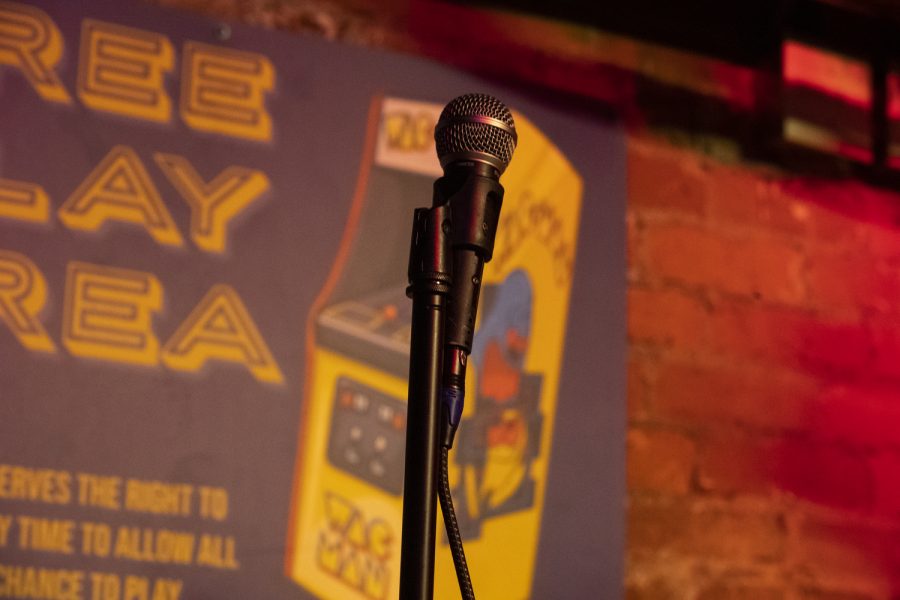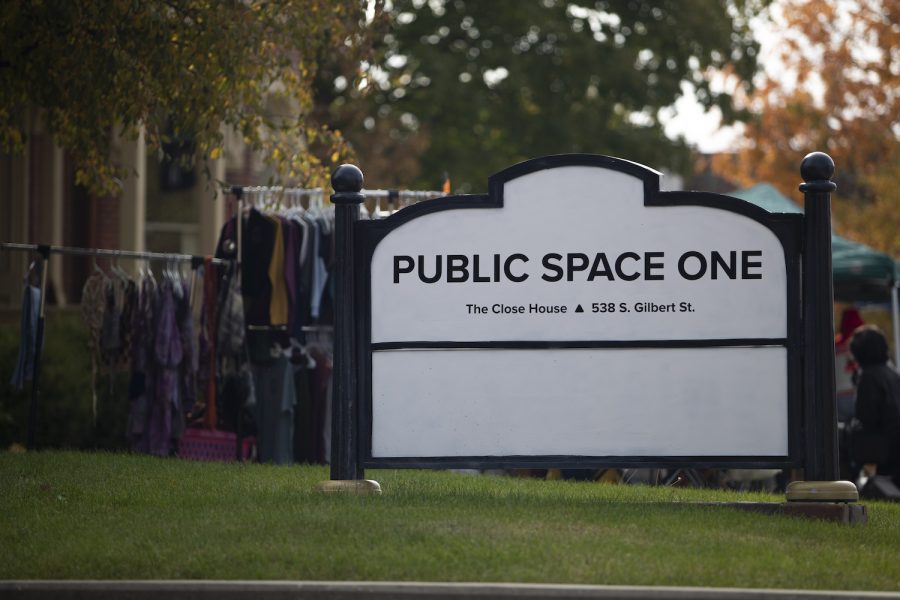"You’re off-stage, dude," a director said to a out-of-place actor. The busy hum of chatter filled the Theatre Building’s Theatre B as actors scrambled to find their places and their props amid a flurry of rehearsal activity.
In spite of the hectic atmosphere, the space was filled with camaraderie, jokes, and teasing.
The stage manager shouted for quiet, and the theater descended into darkness before the bright beam of a spotlight shone on the lone actor on stage.
Eight new plays will première at 8 p.m. today in the Theatre Building’s Theatre B, when the 10-Minute Play Festival returns to the UI for its 15th year.
"They’re all over the place, which is what we want, and that’s what I look for when I’m choosing," said Kate Aspengren, the director of the festival. "I want eight diverse plays."
The 15th year
The 10-Minute Play Festival began in 1997, when Aspengren, an adjunct assistant professor of theater and a graduate of the Playwrights’ Workshop, wanted to give her students a taste of seeing their ideas portrayed on stage.
"I had a particularly talented group of undergraduate writers, and I thought it would be a good way for them to actually see their work produced," she said.
Any undergraduate student may submit work to the festival; this year, organizers received around 55 submissions. The plays go through a first-round of reading before the works are passed on to Aspengren, who chooses eight plays she believes will work together, making sure each is distinct from the next.
"It’s like having eight children," she said. "I would never choose a favorite, and I like them each for different reasons."
Although the festival is composed of eight separate plays, Aspengren urges people to think of the event as one big production rather than eight separate ones.
"So they have to think about what’s going to work for the greater good of the whole piece and not just their own," she said.
A festival of firsts
Many of the students in the festival participate as playwrights, actors, and directors for the first time.
Caitlin Dorsett, a freshman theater and English major, said she has long been interested in playwriting; her play "Civil Behavior" is the first piece she has submitted to anything.
"It was definitely intimidating," she said. " I didn’t know any of the playwrights or directors at first, but Kate was very welcoming, and everyone else was available to ask questions and really open and supportive."
Dorsett said a huge benefit of being involved in the festival is the opportunity to learn from older students.
"You can ask them questions and clarify basically anything, because these people have been here a lot longer than I have, so they’re a great resource," she said.
Senior theater and psychology major Holly Behnami will have her directing début in the festival with Levi Smith’s play "Green Grass Song."
She said the festival taught her how much she enjoys directing.
"When you’re directing the show, you have a lot of power over artistic choices that are being made," she said. "It’s really cool to see your ideas realized on stage."
Participating in a new role was challenging for Noah Brown, an actor in senior theater and English major Taylor Bradley’s play "1954: The Gain and Loss of Understanding." As a resident assistant and someone who has participated in more behind-the-scenes theater roles, he had to learn to be less in charge.
"I’ve had a little more control in the past, so I kind of have to let Taylor direct me more and just trust that she’s doing the right thing," he said.
Brown said he has enjoyed seeing the theatrical process from a different angle.
"It’s a whole different energy in front of an audience on a stage instead of behind it," he said.
Collaboration
A large part of the festival consists of playwrights, actors, and directors learning how to collaborate in order to produce a work that will mesmerize the audience.
Behnami said her directing style involves a lot of "give-and-take" and listening to what her actors and playwright have to say.
"I shouldn’t be telling [them] exactly what they should be doing word for word, because then, there’s no freedom in acting for the actors," she said. "They need to be able to explore and make choices as well — it’s not a dictatorship."
The biggest lesson she learned, she said, was to have patience and listen in order to understand other people’s points of view.
"The biggest hurdle can be if you cut people off or don’t let them explain what they mean," she said. "You really have to ask questions, because you might think you know what people are saying and what their idea is when they actually have something completely different in mind."
Cooperation also played a large role in the festival for Bradley, who both wrote the play "1954" and directed it.
She said she has enjoyed collaborating and being part of a collection of shows.
"It’s interesting to have to think about every decision you make affecting everybody else," she said. "It’s very neat, though."
The potential in the students hints at their future careers.
Aspengren said she has heard from a lot of the past playwrights this year about the effect the festival had on them. In the lobby of the Theatre Building, 27 messages will be posted from past playwrights.
For many of them, the 10-Minute Play Festival is where they became interested in writing, acting, and directing.
"It’s really interesting and heartening to know that these playwrights, actors, and directors are having this experience now and will have this as a starting point for a lot of their work for years to come," Aspengren said.





